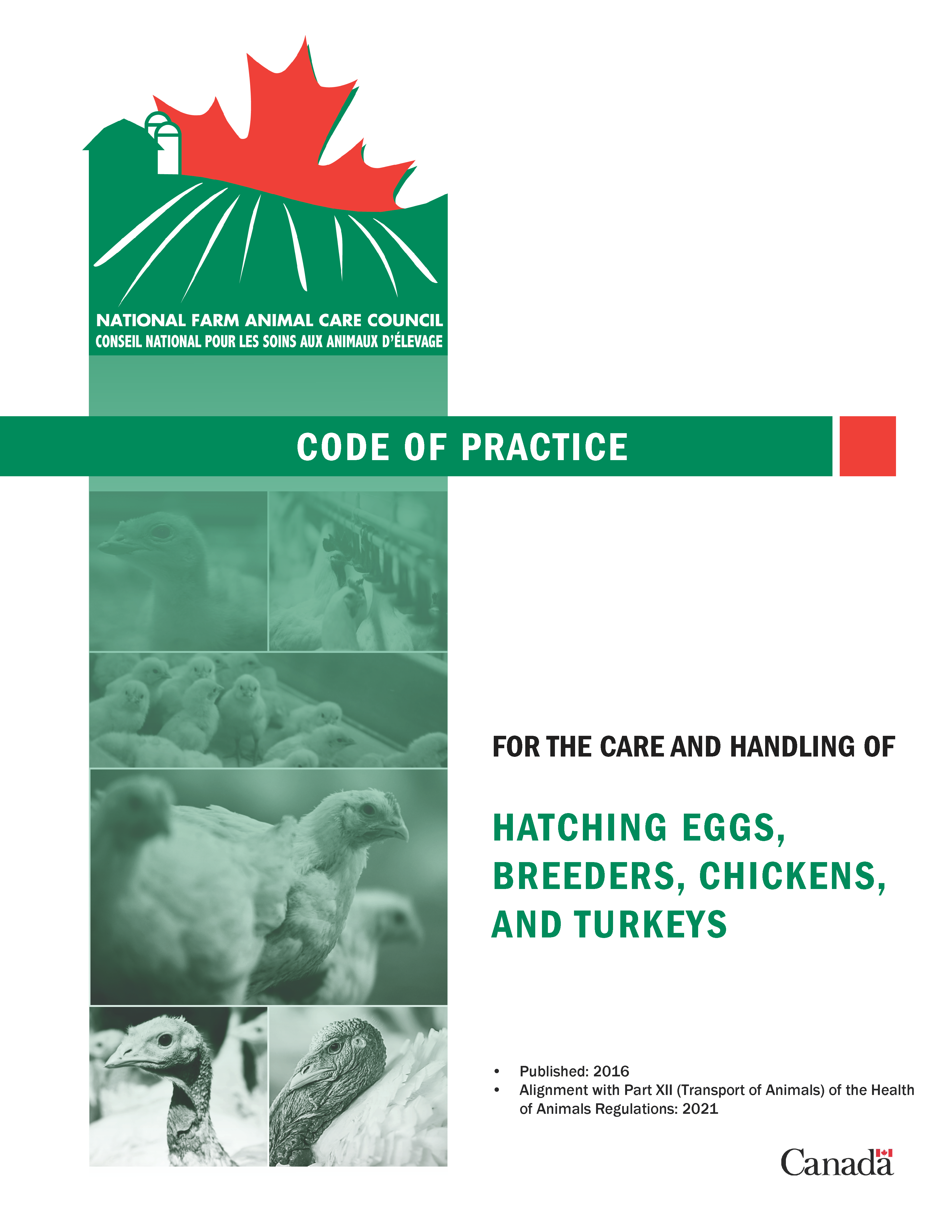Codes Of Practice
Developed through NFACC
- Bison
- Dairy Cattle
- Farmed Fox
- Farmed Mink
- Farmed Salmonids
- Goats
- Pullets and Laying Hens
- Rabbits
- Veal Cattle
Under Revision
Archived Recommended Codes of Practice
Code Development Process
Chickens, Turkeys and Breeders
CODE UNDER REVISION
The Code of Practice for the Care and Handling of Hatching Eggs, Breeders, Chickens and Turkeys was released in 2016. An update to this Code was initiated in 2023.
Code update timeline:
- Start: September 2024
- Public comment period: September - October 2026
- Projected completion: September 2027
Timeline for all Codes of Practice being amended or updated.
Code update resources:
Current Code of Practice and related resources are below.
Committees
Code Committee members
The Code Committee is populated in accordance with Step 1 of NFACC’s Code development process.
| Role | Committee Member | Organization |
| Producer representative | Calvin Breukelman (Chair) | Canadian Hatching Egg Producers |
| Astrid Stephenson (Vice-Chair) | Turkey Farmers of Canada | |
| Ray Nickel | Chicken Farmers of Canada | |
Rick Kaptein | Chicken Farmers of Canada | |
Mark Woods | Canadian Hatching Egg Producers | |
| Jorge Gallegos | Canadian Hatchery Federation | |
| Jean-Michel Allard-Prus | Canadian Hatchery Federation | |
| Krystle Vanderzanden | Turkey Farmers of Canada | |
| Elana Huong | Turkey Farmers of Canada | |
| Transporter | Sarah Sheppard | Moonfleet Poultry |
| Veterinarian | Kathleen Long | Canadian Veterinary Medical Association |
| National animal welfare advocacy association | Michelle Jendral | Humane Canada |
| Provincial animal protection enforcement authority | Kaley Pugh | BC SPCA |
| Provincial government representative with responsibilities in animal welfare | Alex Stavert | Nova Scotia Department of Agriculture |
| Retail and food service organization | Requested but not filled | |
| Processor | Danielle Fawcett | Canadian Poultry and Egg Processors |
| Federal government | Angela Rouillard | Agriculture and Agri-Food Canada |
| Sarah Johannson | Canadian Food Inspection Agency | |
| Researcher/academic | Martine Boulianne | Scientific Committee Chair |
Scientific Committee members
The Scientific Committee is populated in accordance with Step 2 of NFACC’s Code development process.
Name | Named by |
| Martine Boulianne, DVM, PhD, DACPV (Chair) | Canadian Veterinary Medical Association |
| Stephanie Torrey, PhD | International Society for Applied Ethology |
| Tina Widowski, PhD | International Society for Applied Ethology |
| Alexandra Harlander, DVM, DVSc, PhD, DECAWBM (AWSEL) | Canadian Veterinary Medical Association |
| Karen Schwean-Lardner, PhD | Canadian Society of Animal Science |
- HTML version (or select from the Table of Contents below)
- PDF version (1.9 MB)
There are a limited number of hard copies of this Code. NFACC encourages use of the electronic version and does not store hard copies. If hard copies are required, please contact the Canadian Hatching Egg Producers, Chicken Farmers of Canada or Turkey Farmers of Canada.
Please note that content in the transportation section of this Code, along with additional transportation-related content (e.g., glossary terms) that had referenced or reflected the outdated version of Part XII (Transport of Animals) in the Health of Animal Regulations (HAR), or the now archived Compromised Animals Policy, has been updated to align with the amended regulations, which took effect on February 20, 2020. Hard copies of the Codes that were printed prior to this alignment will not include these updates. For clarity, Codes that have been updated will include a statement on the front cover that reads “Alignment with Part XII (Transport of Animals) of the Health of Animals Regulations: 2021”.
This update process was strictly aimed at revising existing text that no longer aligned with the amended HAR. Every effort was made to respect the original priorities and decisions of the Code Development Committee (e.g., text from the HAR was not added if it was not covered in the original Code). In case of a discrepancy between the hard copy and online version of a Code, the online version shall take precedence.
Other resources:
- Scientific Committee report - Review of scientific research on priority issues - November 2013
- NFACC Code development process
- Animal Welfare Research Needs
- Canadian Veterinary Medical Association (CVMA)
- Induced Moulting of Poultry – Position Statement

